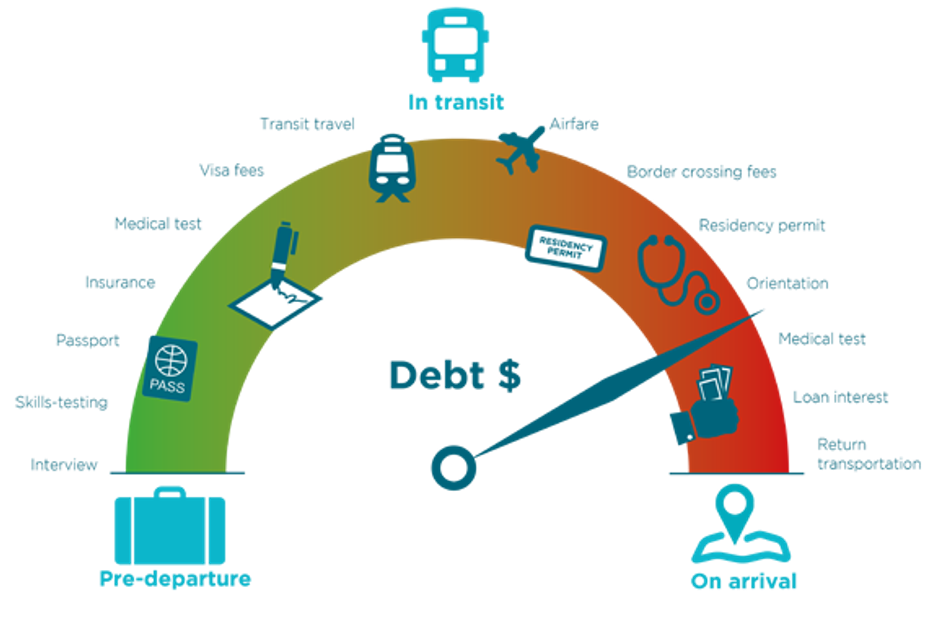What are recruitment fees?
4 April 2022

Migrant workers drive global supply chains
There are 169 million migrant workers in the world, 5% of the global workforce - meaning one in every 20 workers is a migrant. These migrant workers are employed in all sectors and locations producing goods and delivering services. Some sectors, particularly those requiring large numbers of low-wage workers, are especially reliant on substantial migrant workforces.
Despite the significant contributions of these workers to the global economy, migrant workers face challenges at all stages of the migration cycle, as illustrated by the Dhaka Principles for Migration With Dignity. Much attention has focused on the start of the migration cycle and the deeply flawed recruitment processes migrant workers are commonly subjected to - in particular, the practice of charging recruitment costs and fees to workers.
Migrant worker recruitment fees costs and charges
Low wage migrant workers are frequently expected to pay fees to agencies and brokers for recruitment to jobs abroad. These fees may cover a variety of costs including: the recruitment itself, travel, visa and administrative costs and other unspecified fees and service charges. Often these fees and charges bear little relation to the genuine costs of delivering these services. These fees are often substantial and are sometimes set up as loans with high rates of compound interest. Sometimes those employing the workers will pay the fees in the first instance but then deduct the cost from worker’s wages over a period of time.
ILO definition of recruitment fees costs and charges
The various charges, fees, and costs related to recruitment were clarified in the ILO definition of recruitment fees and related costs. This important definition, made clear that recruitment fees refer to:
“any fees or costs incurred in the recruitment process in order for workers to secure employment or placement, regardless of the manner, timing or location of their imposition or collection.”
Recruitment agents and the recruitment process
The EU Employment and Recruitment Agencies Sector Guide on implementing the UN Guiding Principles on Business and Human Rights, developed by IHRB and Shift, outlines how agencies can implement their responsibility to respect for human rights in their operations, and how best practice aligned with international norms and standards can be enforced by governments. Many recruiters’ operating procedures however fail to align with international standards, and their business models are based on exploitation of workers.
Recruitment is a business cost and should be paid by business. In practice this can be challenging given the large numbers of workers seeking employment may mean recruiters lack leverage with hiring managers, who will demand low cost or no cost services for job offers to be made to workers. Sometimes they will even expect payments from these agencies to make job offers, effectively selling jobs. Recruiters will in turn charge these costs, and more, to workers. Lack of effective government legislation or scrutiny as well as corruption within often bureaucratic migration processes results in little effective protection in practice for migrant workers. Over the years, this system has become deeply entrenched and is often viewed as normal or expected, including by workers, who may even be suspicious of ethical agencies who operate without charging them fees.
The impact of recruitment fees charged to workers
Modern Slavery - The costs charged to migrant workers to secure employment abroad are often substantial. To afford these fees workers may take out loans against the promise of potential future earnings. This may leave them in situations of debt bondage and vulnerable to further exploitation including forced labour. Ending the practice of recruitment fees being charged to workers has become a major focus of strategies by business and government to prevent “modern slavery”.

Lost development potential – Migrant remittances to countries of origin are used to support families and communities back home. In some countries remittances from those working abroad account for a significant proportion of GDP back ion countries of origin. In 2021 $589 billion was remitted to developing economies more than 3 times Official Development Assistance. Servicing recruitment debt inevitably means that migrant remittances to their home countries will be reduced with negative impacts on development and realisation on the 2030 Sustainable Development Goals.
Sustainable Development Goals – Charging recruitment fees to workers impacts on many of the Sustainable Development Goals. In particular:
- SDG 1 - Eradication of Poverty
- SDG 4 - Ensure inclusive and equitable education and promote lifelong learning opportunities for all
- SDG 5 - Achieve Gender equality and empower women and girls
- SDG 8 - Promote sustained, inclusive and sustainable economic growth, full and productive employment and decent work for all
- SDG 9 - Build resilient infrastructure, promote inclusive and sustainable industrialisation and foster innovation
- SDG 10 - Reduce inequalities within and among countries
- SDG 16 - Promote peaceful and inclusive societies for sustainable development, provide access to justice for all and build effective, accountable and inclusive institutions at all levels
Government policies and processes on migrant worker recruitment
Governments have a duty to protect migrant workers human rights. Yet charging recruitment fees to migrant workers is not illegal in some countries. IHRB and many others would like to see a global prohibition on the practice. Such a measure would not just safeguard individual migrant workers but also allow rights respecting businesses, both recruiters and those employing migrant workers, to compete fairly within the law.
Protection however would also be dependent on appropriate legislation and enforcement of laws. In many recruitment corridors this is lacking. In some countries, poorly designed, expensive, and bureaucratic migration processes can actually become additional places where fees may be extracted or provide other opportunities for corruption and bribery.
The Montreal Recommendations on Recruitment
In 2020, The Montreal Recommendations on Recruitment, a process organised by the International Organisation for Migration (IOM), the UN's migration agency, sought to offer a roadmap for better regulation of the recruitment industry, bringing together licensing and enforcement bodies from countries around the world.
The Montreal Recommendations offer policymakers and regulators practical guidance and ideas to improve regulation and oversight of international recruitment and protection of migrant workers including on:
- recruitment fees;
- licensing and registration of labour recruiters;
- inspections and enforcement;
- access to grievance mechanisms and dispute resolution;
- bilateral and multilateral mechanisms;
- migrant welfare and assistance.
Further development and promotion of the recommendations is now required if they are to become the global standards for recruitment regulation.
Preventing the charging of recruitment fees to migrant workers
Recruitment is a business cost and should be paid by business. Many initiatives exist to challenge the idea that workers should have to pay to get a job. Some of the best known include:
IHRB's Leadership Group for Responsible Recruitment: the Leadership Group is an initiative that seeks to use the collective leverage of global brands supported by civil society partners and UN organisations to advocate for change in the ways that migrant workers are recruited. All corporate members of the Leadership Group are committed to the Employer Pays Principle and seek to implement it in their global operations.
The Responsible Labor Initiative: an initiative of the Responsible Business Alliance The RLI is a multi-industry, multi-stakeholder initiative focused on ensuring that the rights of workers vulnerable to forced labour in global supply chains are consistently respected and promoted.
Issara Institute: an independent, non-governmental organisation based in Southeast Asia and the United States tackling issues of human trafficking and forced labour through worker voice, partnership, and innovation. They have a strong focus on recruitment processes for migrant workers and based on extensive work with migrant workers on the ground have produced a number of excellent research reports.
Responsible Recruitment Toolkit: an organisation that offers advice, guidance, tools and training on how to ensure workers are recruited safely and ethically.
Repayment of recruitment fees to migrant workers
Despite many efforts to prevent charging recruitment fees to workers the practice is still prevalent within some recruitment corridors. Companies who find workers in their direct operations or supply chains have paid fees should repay those workers.
The repayment of recruitment fees has received increased attention in recent years due to the increased use of Withhold Release Orders by the US Border Force on goods deemed to be the products of forced labour. Repayment of recruitment fees to workers has been a condition of goods being released.
Repayment is important to:
- Address any immediate situations of debt bondage for workers
- Ensure that money earned abroad stays with workers rather than being used to service recruitment debt
- Sharpen the focus of companies employing migrant workers to better map and understand the recruitment process and where risks of exploitation may lie.
In 2021 sustainability consultants Impactt developed a set of principles for repayment of fees to workers that have generally been accepted as best practice.
Listen to the IHRB Voices Podcast Interview on the Repayment Principles with Rosey Hurst the CEO of Impactt.
Digital tools for migrant workers
A number of digital tools exist offering advice and guidance directly to migrant workers seeking employment abroad:


